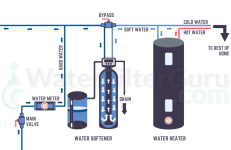Hey Gang,
Our basement is below the level of our septic system, so any water used has to be pumped up.
We have a pump in the bathroom for toilet, shower and sink and we have a larger pump for the water softener.
The issue I have (which many have for this or a sump pump) is when the larger pump finishes it cycle it "bangs" closed.
Not a issue with the pump but more like the water hammering when the valve closes. It happens only when the water softener recharges at 2am. From what I can tell this is a very common issue. Has anybody dealt with this and found a solution to quiet it down?
Our basement is below the level of our septic system, so any water used has to be pumped up.
We have a pump in the bathroom for toilet, shower and sink and we have a larger pump for the water softener.
The issue I have (which many have for this or a sump pump) is when the larger pump finishes it cycle it "bangs" closed.
Not a issue with the pump but more like the water hammering when the valve closes. It happens only when the water softener recharges at 2am. From what I can tell this is a very common issue. Has anybody dealt with this and found a solution to quiet it down?


















